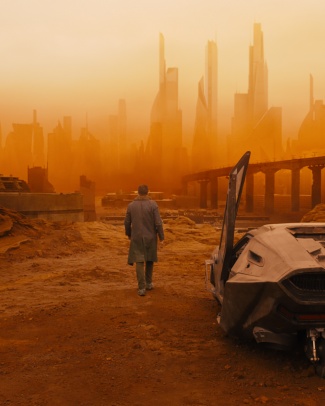Bladerunner 2049 is a dark, gloomy dystopian vision of the world some 30 years from now. Or possibly it is pulling its punches and this is where we are headed just a few years hence, as the current generation of political chancers finally exit stage left. Either way, watching it yesterday with Saharan sandstorm turning the skies “weird” was itself a weird experience, as on-screen weather eerily mimicked outdoors.
Uncomfortable. Unsettling. I have never quite bought into the Bladerunner franchise, with its one film and ever-growing ensemble of cuts, re-cuts and Director’s cuts. I have understood that fans of sci-fi have regularly declared the original to be the greatest ever, bandying round words like “classic” and “masterpiece” like so much confetti. Whereas I have remained outside this geek consensus, looking in: aware that beyond the glass, something wonderful, magnificent is taking place – but never quite getting it.
As Bladerunner, so this, the next gen version. Once more I felt bystander to an experience that was undoubtedly worthy, yet never quite engaged me. The action takes place some 30 years on from the first film which, were it “true” actually takes place 2 years hence, in 2019.
The world is darker, gloomier, rain-spattered. Bad weather, along with no more trees and little vegetation are consequence of some unspecified eco-disaster that took place a while before the film’s action. Or about 10 years in our future, which may not be quite so outlandish a prediction.
Same old same old. In colonising space, man has created replicants: beings that look and sound and mostly function like humans, but aren’t. In the original, these turned rogue, and a replicant hunter (or “Bladerunner”) called Deckard (Harrison Ford) was tasked with tracking and “retiring” a particularly gifted group of replicants. Fast forward to 2049 and the blade-running continues, now carried out by tame replicants like K (Ryan Gosling).
A chance encounter with Sapper (Dave Bautista), a hold-over from earlier times reveals a “miracle” - a secret – that throws all assumptions about the relative status of man and machine into turmoil. For once in the long ago a human and a replicant got together and a child was born. As Lieutenant Joshi (Robin Wright), K’s cynical boss puts it: “The World is built in a wall that separates kind. Tell either side there’s no wall, you’ve bought a war. Or a slaughter.”
She’s cheerful like that.
K is despatched to find the child. Hot on his heels is amoral squillionaire (Jared Leto) and his psychotic replicant assistant, Luv (Sylvia Hoeks). Along the way, they work out that Deckard is still alive and knows something about the child’s whereabouts. At one level, this is therefore fairly standard chase film: can the good guys find the “thing”, the gizmo, the whatchamacallit before the bad guys; and can they hold on to it once they do?
What sets this apart are three features that evoke the original. First, the landscape. Sit back: treat Bladerunner 2049 as future tourism, a safari through the ruins of man and….just soak it in. It is awful, yet awesome in its awfulness: a tour de force, earning Director Denis Villeneuve many plaudits for his vision. Second, the music: this adds and compounds the atmosphere, always loud, alternately majestic, insistent and hopeless.
There are echoes here of Uranus from Holst’s Planet Suite: not so much God but bragadoccio magician, sometimes bumbling, occasionally grand. Coincidence? Or something else? Holst’s Uranus is often identified with Prometheus, the bringer of life in Greek myth. Geeks have noted other Promethean hints buried within the narrative (not least sound effects borrowed from Ridley Scott’s Alien franchise, including the recent Prometheus).
Over all, though, hang the big existential questions. What happens when you create an intellignece in every way an equal to human bar one: which is that it is not human. The same poignant longing found in the original is here replayed in the relationship between K and his AI unit, Joi (Ana de Armas). The latter is in love with her “owner”: yet, being a virtual entity, can never achieve physical fulfillment. Her efforts to do so, potentially creepy, are here just sad, sad, sad.
And watch out for the rain, as Villeneuve uses rain (and snow) to make points about authenticity.
If the film has a weakness, it lies in the big questions asked by Philip K Dick, whose novels form the inspiration for many contemporary works (including this). Dick got it so right: the questions he asked over half a century ago, about the boundaries between human and machine, real and unreal were once the unthinkable, the ridiculous. Yet post-Terminator, post-The Matrix, society is now grappling daily with questions of how to deal with artificial intelligence, machine learning and reality.
History has caught up to him, and like other prophets, his future is now so commonplace, so everyday that we have almost entirely forgotten just how far ahead of the curve he was.
A great film – though it will never be my favourite.
Four stars.


